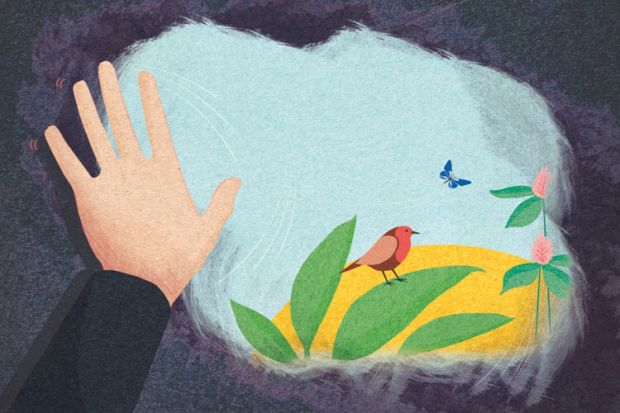It probably helped that the doctor who gave me the diagnosis thought I already knew what was wrong with me, and it certainly didn’t hurt that I was still sedated from the intimate rigours of the examination. He was direct, pragmatic and very clear about the scale of the trouble I was in. “If it’s operable, you’ll need major surgery and a minimum of three months off work…”
Such was my naivety that the thought of a three-month break in my work life was the most shocking part of the conversation – I almost missed the important part of the prognosis: that my cancer might not be operable and that my life expectancy might be measured in months, single figures of months at that.
Telling my family was difficult. Telling my boss and university colleagues seemed almost more so. It weighed on me, in my debilitated, traumatised state, that I was admitting to a level of personal weakness that would reduce their perception of my value. Somehow it never occurred to me that they would be on my side – supportive and concerned in equal measures. Later, I felt nagging guilt that I had underestimated them so badly.
With only a few days until the surgery, I was forced into a descending spiral of frantic, fatalistic activity as I parked, cancelled and handed over the work that I had planned for the rest of the semester – trying all the while to cling to the thought that in a few months I’d be right back in the groove, fighting fit, ready to rock and roll. It was only an operation, right?
Wrong. The surgery had a much bigger impact on me than I’d imagined. It was a close-run thing, and I woke up in intensive care surrounded by machinery and riddled with tubes. The shock was immense, but only slightly less of a surprise was the handwritten card from my then vice-chancellor wishing me a speedy recovery – a personal touch that confirmed my view of him as a really nice chap.
The chemotherapy that followed was an interesting chapter for a former lab rat – on my first cycle of treatment, I had a jolly time reading the warning labels on the bag of fluid draining into me. Through the murky haze of chemical confusion, I concluded that in my former trade I would have handled these reagents only in a fume hood with gloves and eye protection. Irony doesn’t begin to cover it.
My working life has always been important to me, and I was keen to get back into action as soon as possible. What I hadn’t considered was the effect that this would inevitably have on my colleagues. Three years later, having survived another episode after the cancer spread, I have perhaps a better perspective on the lengths that everyone went to in order to support me. I’m writing this while in a gloriously welcome state of remission – so before anything else happens I’d like to thank a lot of folk for what they have done for me.
Without the staff of the NHS, I wouldn’t be here: I’d be dead. That means that I’m more grateful to them than I can possibly express. But in terms of my colleagues, my thanks go to all of you – without exception – for a variety of reasons:
To those who waited while the effects of chemotherapy contrived to spill my coffee and make me drop teaspoons, cups and saucers that I really thought I had a firm grip on.
To the kindly folk who went out of their way to spend time with me when they would rather have been somewhere, anywhere, else.
To everyone who listened while I told them the same things I’d told them the day before – things they would have much preferred not to hear at all.
To the colleagues who waited patiently for paperwork, marking, exam questions and everything else.
To those who didn’t wait – who kept challenging me to deliver, who didn’t let me become cosily, self-indulgently ill.
To the ones who understood – some because of their own experiences – and to those who didn’t but put up with me anyway.
To the people who helped me fight, and laugh, and weep.
To the colleagues whose names I forgot, or mangled or mixed up while in the full, numbing grip of chemo-brain.
To the editors to whom I spun flawed promises that stretched their patience and credulity.
To the boss who told me to take the time I needed, and then – I suspect – rode shotgun for me with the administration.
It is fashionable, almost a requirement, to say that we have a tough time in higher education. Maybe we do, sometimes. But having seen from the inside the way the NHS works – and works amazingly well – on the basis of massive, sustained personal commitment and sacrifice from its staff as they perform truly ghastly tasks, I want to remind folk that in many cases a career in the university sector is a dream ticket compared with almost anything else we could be doing.
Others will have had different experiences: your mileage, as they say, may vary. In my case though, I feel lucky to be alive – and even luckier in my friends and colleagues.
John Gilbey teaches in the department of computer science at Aberystwyth University.
POSTSCRIPT:
Print headline: To see with new eyes
Register to continue
Why register?
- Registration is free and only takes a moment
- Once registered, you can read 3 articles a month
- Sign up for our newsletter
Subscribe
Or subscribe for unlimited access to:
- Unlimited access to news, views, insights & reviews
- Digital editions
- Digital access to THE’s university and college rankings analysis
Already registered or a current subscriber?
